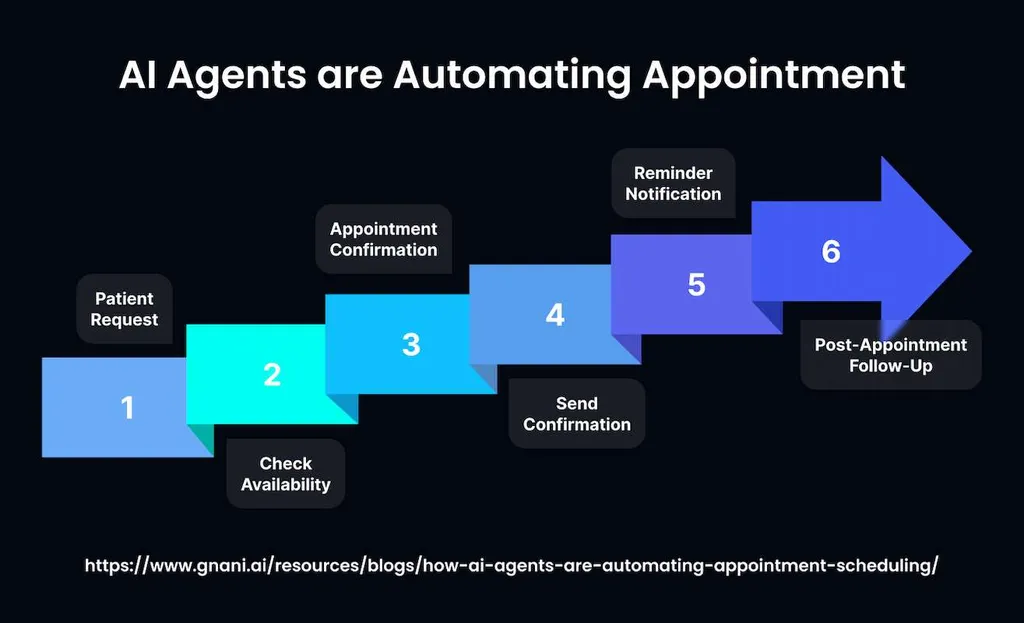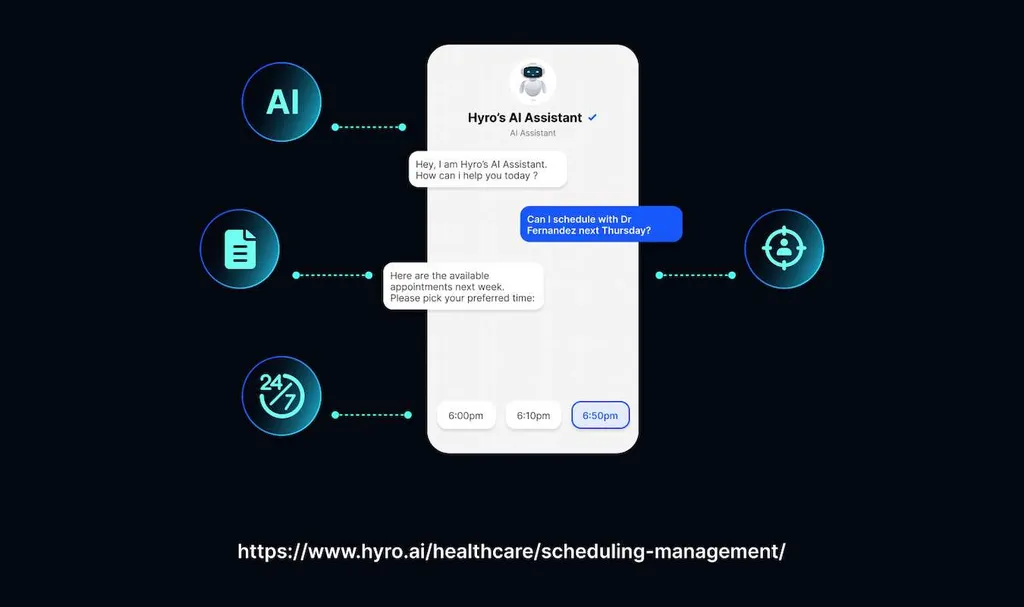Modern medicine is based on patient comfort, but standard methods of scheduling an appointment with a doctor require a lot of effort and time. Long waiting periods, missed calls, and scheduling inaccuracies cause discomfort for doctors and patients. With the growing demand for accurate and fast scheduling, digital products based on artificial intelligence (AI) are transforming doctor activity. This article will tell you how AI appointment setter benefits healthcare.
What is AI Patient Scheduling, and Why Does It Matter?
AI patient scheduling utilizes artificial intelligence to automate and control all appointments. Such solutions reject the human factor and implement scheduling technologies that consider the principles of urgency, accessibility, and preferences. Advanced software goes further and offers additional functionality, including automatic reminders, individualized dialogues, and data-based examination scheduling. Such digital solutions decrease the number of live agents’ mistakes and ensure uninterrupted activity for medical staff and clients.
AI-backed patient scheduling allows you to fill gaps in the timetable, decrease no-shows, and provide each visitor with the proper time for a consultation. The app explores historical databases to notify the medical institution about the risk of a missed or canceled meeting. It allows service providers to rebook the consultation rationally or suggest this time to another client.
How is AI Transforming Patient Appointment Scheduling?

More and more practices are adopting AI to build patient appointment plans. Below, we will analyze how AI appointment setter benefits healthcare.
- Self-service capabilities. Modern AI for healthcare helps people schedule and cancel consultations conveniently without involving staff.
- Personalized interactions. AI-backed solutions may process information to individualize communications. If a person has a history of past visits, AI can suggest the optimal time for a future appointment, considering previous choices, or send reminders tailored to visit history. It increases customer loyalty.
- Ability to make an appointment day and night. AI-backed chatbots work around the clock so patients can make appointments even when the medical facility staff rests. It is helpful when we speak about people with a busy work schedule and those who make an appointment at the last minute.
- Cutting administrative spending. Clinics automate repetitive activities, including refilling prescriptions or making appointments, to relieve the burden on staff. According to the study, about 40% of support calls can be redirected to self-service so that medical staff can focus on more serious tasks.
- Reduced waiting times. AI-backed systems handle multiple requests simultaneously, reducing patient waiting times. With automated support, people don’t have to wait in long lines, which speeds up the process and makes it more efficient.
- Possibility of multilingual support to deal with different patient groups. Since clinics serve people from different cultures, AI-backed solutions may conduct dialogues in various languages, removing barriers and ensuring accessibility. Multilingual apps allow non-native speakers to book, change, or cancel a consultation comfortably. It creates an inclusive experience that considers each visitor’s needs.
AI-backed systems allow customers to agree about the consultation through different channels, including phone, app, and website. This multichannel accessibility lets patients interact with the medical institution conveniently and ensures easy app adaptation.
Troubles with AI in Forming a Patient Scheduling
Despite the profits of adding AI to hospital patient care, this technology has some downsides.
- Data security. Information privacy plays a key role since patient data is extremely sensitive. Fraudsters can use datasets to steal personal information and perform other criminal actions. Service providers should choose secure software with many tools to protect anonymity and data security.
- Synchronization with other software. Many clinics adopt electronic health record (EHR) systems to handle client data. Synchronizing digital products with AI-backed tools can be complex, requiring software configuration, employee teaching, and activity adjustments. Despite all the difficulties, successful synchronization will allow you to forget about duplicate records and increase the accuracy of the AI patient appointment scheduling.
- Bias issues. Medical datasets may contain biases affecting accuracy and trust in AI-backed applications. Teaching smart models on such information may lead to unfair planning and mis-prioritization of consultations. It is vital to select diverse racial, gender, and social data to form systems that provide equal access for all people.
We recommend seeking help from MetaDialog professionals to avoid problems during system development, deployment, and use.
Examples of Using AI in Appointment Management

Adding AI to a medical practice ensures the smooth operation of clinics and allows patients and staff to sleep soundly. AI-backed systems automate various activities, from monitoring visitor records to choosing a repeat appointment time. Such automation decreases the number of errors connected with manual labor. Consider several other examples, such as AI appointment setter benefits healthcare.
- Automated booking, schedule adjustments, and cancellations. AI-backed systems simplify various stages of the appointment. Users may book, adjust the time, or cancel a doctor’s consultation and receive real-time confirmation for each action. Such intelligent automation allows the medical staff to spend more time with visitors.
- Appointment reminders. AI-ruled software automatically sends patients SMS or email reminders so they do not miss a doctor’s consultation. It decreases the risk of no-shows and increases user engagement. Individualized reminders can also include additional information on preparing for the meeting.
- Data accumulation and analytics. AI-backed systems may process considerable data volume and find regularities in client behavior. AI enhances decision-making, eliminates bottlenecks, and optimizes provider work hours. Generative AI performs deep learning analysis and generates forecasts to correct planning tactics.
- Smart routing optimizes provider workload. The system may utilize AI to efficiently route people to the most appropriate specialists. The application evaluates the user’s case history, visit urgency, and current address to evenly distribute workloads and enhance the patient experience. Generative AI corrects real-time timetables, ensuring balanced workloads and optimal service delivery.
As developers present new modifications to artificial intelligence scheduling software in medical institutions, the scope of applications is expanding.
Tips for Adopting AI-Backed Apps in Appointment Scheduling
Adopting AI-backed software for appointment planning enhances clinic operations, raises user satisfaction, and decreases waiting times. To experience these benefits, you need to add the software correctly. Let’s look at some recommendations from MetaDialog.
- Assess your goals. Think about what problems your bot should solve. Typically, these are related to reducing waiting times, increasing patient satisfaction, and increasing appointment efficiency. Consider these priorities when choosing software functionality.
- Protecting customer information. Choose systems that comply with healthcare regulations, such as HIPAA. Make sure the software offers advanced tools to protect user information.
- Synchronization with current systems. It is essential to synchronize the AI for scheduling with the EHR and other applications used by the medical institution. This will allow you to maintain consistent data across platforms.
- Train employees. Tell your staff how to utilize the AI-backed scheduling application. They must understand its profits and functionality. Solve any issues to ensure smooth adoption.
Once the system is in place, it is vital to monitor its effectiveness continually. Collect reviews from visitors and specialists to identify sectors for improvement. Utilize the information to increase the digital solution’s effectiveness and customer gratification.
Final Words
AI systems transform appointment scheduling, turning time-consuming and cumbersome procedures into a stable and efficient experience. Smart solutions automate routine activities, raise customer gratification, and optimize provider activities, making medicine more accessible.
Are you ready to revolutionize medicine? Contact MetaDialog specialists to enhance your appointment scheduling and increase efficiency. We are prepared to show you the future of medicine today!
